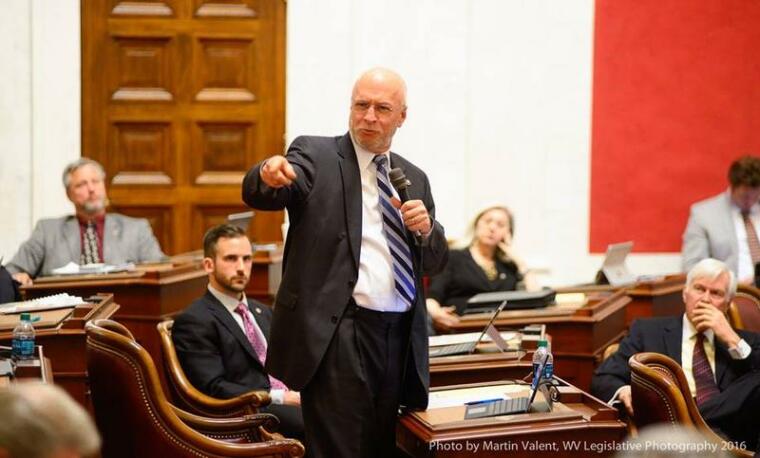Lawmaker wants amendment prohibiting local pro-LGBT ordinances

CHARLESTON, W.V. (Christian Examiner) – A Republican lawmaker in West Virginia has introduced a resolution calling for a constitutional amendment to forbid cities in the traditionally conservative state from enacting "human rights ordinances" that create a special class of protection for the lesbian, gay, bi-sexual and transgender members of those communities.
The state's Human Rights Act already contains protections for West Virginia's citizens based on gender, religion, race and national origin, but none for those who identify as LGBT. So far, eight cities have gone beyond the protections offered in the state's constitution and extended coverage based on the category of sexual orientation.
On Saturday, Sen. Craig Blair, who is also the Majority Whip and whose district includes the city of Martinsburg, the latest city to enact a law offering protections for the LGBT persons, said the resolution was necessary because the state was becoming "a quilt or a patchwork of different ordinances pertaining to this issue."
"This doesn't have anything to do with discrimination or anything like that," Blair said. "That's not what this legislation is about. It's about jobs. We're trying to level the playing field throughout West Virginia making so we can actually get jobs here and get people back to work and treat every one of our West Virginia citizens equally and fairly."
His reasoning wasn't enough to placate critics who believe Blair is stoking the flames of "homophobia." Andrew Schneider, who leads the group Fairness West Virginia, said Blair's resolution was meant to roll back equality and stoke discrimination.
The American Civil Liberties Union of West Virginia also stepped into the fray and called on Blair to remove the resolution from consideration. According the group's spokeswoman, Jennifer Meinig, Blair was attempting to "roll back" protections "in a time when it is still legal to be fired, evicted, or denied service in most parts of the state simply because of whom you love. We hope that this resolution fails to advance."
The future of the joint resolution is far from certain as a majority of the state's mayors have come out against it. For the resolution offered by Blair to be considered, two-thirds of both chambers (Senate and House of Representatives) also have to approve it.
The timing of the joint resolution happens to coincide with the passage of House Bill 4012, which has received significant attention from the LGBT lobby. That bill, titled the "Religious Freedom Restoration Act" offers protections to Christian business owners who refuse to participate in gay weddings and other gay-themed events for fear of violating their Christian consciences.
Groups like Human Rights Campaign called the bill "dangerous" and "deeply unfortunate." HRC's legal director, Sarah Warbelow, also said that the First Amendment already guarantees protections on religious freedom, which she called a "core value" in American life. HB 4012, however, will "put LGBT people at risk for discrimination and go even further, allowing a person to use HB 4012 as a defense against child abuse of allow a pharmacist to argue he is not required to provide birth control."
HB 4012 was also opposed by the Catholic Committee of Appalachia, but it still passed 72-26.
The creation of local human rights ordinances is not new. Other cities in traditionally conservative states have taken or have attempted to take the same course of action, include Fayetteville, Arkansas, Houston, Texas, and Jacksonville, Florida.
In September 2015, Fayetteville voters ratified a city civil rights ordinance that broadened the categories of protection to include members of the LGBT community. A previous ordinance did the same thing, but it was repealed by voters. That, however, was before the U.S. Supreme Court legalized same-sex marriage in June 2015.
The new ordinance, which passed easily after a contentious campaign, included provisions covering housing and employment discrimination against gays and lesbians. It exempted "churches, religious schools and daycare facilities, and religious organizations of any kind."
The Jacksonville City Council withdrew a bill from consideration Feb. 18 that would have expanded the city's anti-discrimination protections to include members of the LGBT community after the city's mayor, Lenny Curry, said the change was unnecessary.
Curry said he believed the city could accomplish the same thing by executive action. He ordered city officials to expand anti-discrimination rules to cover LGBT persons in the city's employment policies.
Houston was among the first cities to attempt to establish a city-wide non-discrimination ordinance for the LGBT community when its openly lesbian mayor, Annise Parker, pushed HERO (the Houston Equal Rights Ordinance) through the city council.
The Texas Supreme Court, however, ruled that the 2014 gay rights ordinance had to be repealed and any similar ordinance placed before voters. In November, voters rejected the ordinance by a margin of nearly 2-1.
Conservatives and evangelical Christians saw the Houston ordinance as an attempt to force same-sex relationships on churches and other religious organizations, and many pastors came out strong against in when it was first adopted by the Houston City Council.
They also protested Mayor Parker's subpoena of ministers' sermons to investigate how they had addressed HERO. The pastors cried foul and refused to provide the sermons. Such speech, they said, is protected by the First Amendment.
Parker eventually withdrew the subpoenas.